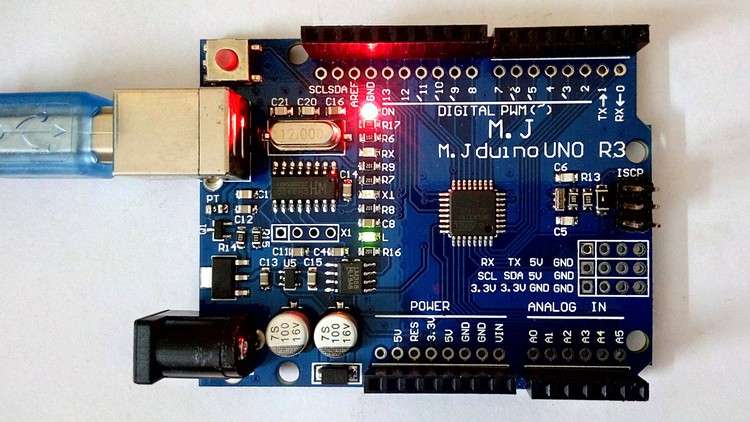
All about Microcontrollers, its Architecture, Arduino, IoT and Cloud
What you will learn
Understand the fundamental concepts of microcontrollers, including their architecture, operation, and applications.
Gain knowledge of Integrated Development Environments (IDEs) used for microcontroller programming and develop proficiency in utilizing them.
Differentiate between microprocessors and microcontrollers, comprehending their unique features and determining their suitable applications.
Acquire a comprehensive understanding of the various blocks used in microcontrollers, their interactions, and specific functions, enabling effective development
Know details of Arduino architecture and its varients
How to code online using Arduino web editor and store your sketches online into the cloud
How Microcontrollers can be used with Internet of Things (IoT)
How microcontrollers use Wi-Fi and Bluetooth and sensors
How to read and understand datasheets and userguides of microcontroller SoC, modules and development boards
Details on ESP8266 and ESP32
Details on Arduino BLE sense
Description
Update: 23-09-2023 – Lectures on Wi-Fi and Bluetooth enabled microcontrollers and development boards have been added.
Update: 18-08-2023 – Unlock a new dimension of Arduino programming and development with our seamless integration of the Arduino Uno Online Editor, Cloud Connectivity, Client Agent, and Arduino Board/Port Management. Experience unparalleled convenience and efficiency as you harness the power of these interconnected components!
Update: 24-05-2023 – You can find attached all the presentation slide used during the lecturing. Happy learning!
Welcome to the Microcontroller Fundamentals Course! In this course, you will have the opportunity to learn from knowledgeable and skillful instructor who will guide you through the world of microcontrollers.
The course begins with an introduction to microcontrollers, where you will gain a solid understanding of what they are and how they work. You will explore the basic differences between microprocessors and microcontrollers, allowing you to make informed decisions on which one to use for different applications.
We will delve into the key differences between microprocessors and microcontrollers through a comprehensive tabular comparison, enabling you to grasp their unique features and functionalities.
You will also discover the various blocks used in microcontrollers, their interactions, and specific tasks. Understanding these blocks is essential for developing applications using microcontrollers effectively.
Memory plays a vital role in microcontrollers (MCUs), and you will learn about different types of memories and their functions. We will specifically explore the memory used by the Arduino Uno (an 8-bit microcontroller) and how it operates.
Special Function Registers (SFRs) and I/O interfaces are critical components of microcontrollers, allowing them to control and configure external peripherals. You will gain insight into the functionality and operation of SFRs and I/O interfaces.
To test your understanding, we will have quizzes throughout the course. One of the quizzes will focus on identifying the specific block used to store firmware/program in a microcontroller.
You will explore the fascinating world of 8-bit microcontrollers. You will learn how the CPU fetches instructions, processes data, and stores it via the data bus on an 8-bit basis. Additionally, we will explore how registers, memory, and the Arithmetic Logic Unit (ALU) operate on 8-bit data.
You will have a solid foundation in microcontroller fundamentals, equipping you with the knowledge and skills needed to work with microcontrollers and develop applications effectively. So, join us on this exciting journey into the world of microcontrollers and unlock new possibilities for your projects!
No prior experience with microcontrollers is required for this course. Basic knowledge of programming concepts and familiarity with electronics will be beneficial but not mandatory. The course is designed to accommodate beginners in the field while providing valuable insights and practical skills for more experienced learners.
You will then learn about arduino web editor and how to write sketches online and store it into the cloud. Then, you will be introduced about MCUs that enable wif-fi and bluetooth. This is important with respect to developing an IoT applications.
Content